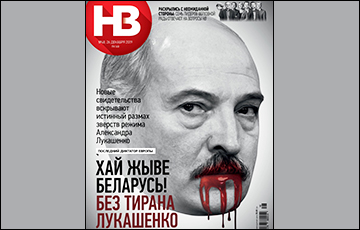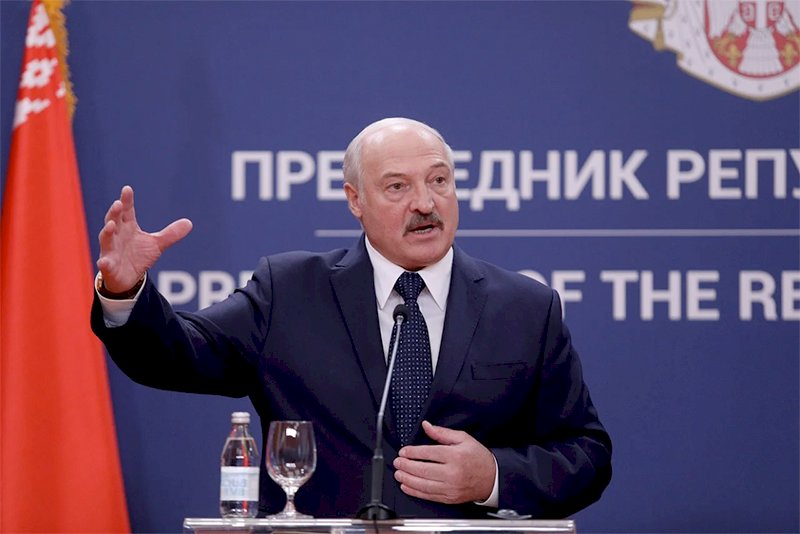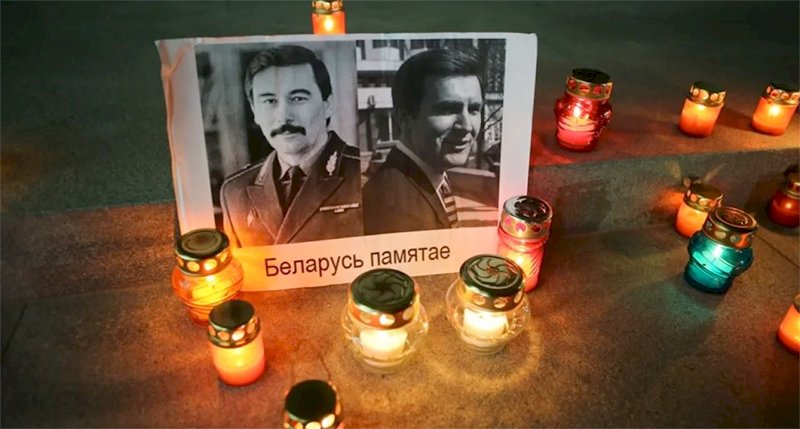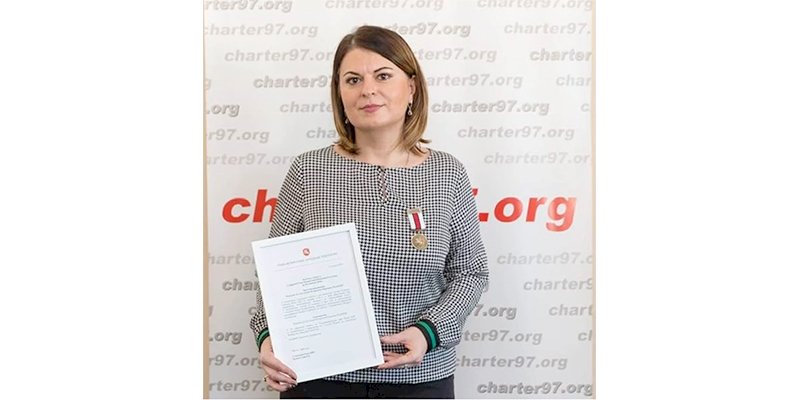New Evidence Reveals True Scale Of Lukashenka Regime Atrocities
122- 26.12.2019, 12:58
- 267,627

The Ukrainian media write about the true face of the Belarusian dictator.
Confessions of the ex-fighter of the special unit of the Belarusian Interior Ministry about his involvement in the murders of the opposition activists reminded Europe about the true face of the permanent Belarusian ruler Aliaksandr Lukashenka, the famous Ukrainian magazine "Novoe Vremya" writes.
On November 12, 2019, Lukashenka paid an official visit to Austria, a country of the European Union. The Belarusian ruler was met at the Hofburg Palace, a luxurious imperial complex, which now houses the presidential residence.
The last dictator of Europe, as Lukashenka is often called in the European media, spoke in Vienna about the importance of closer cooperation between his country and the European Union. At that, it was only in 2016 that the EU lifted personal sanctions from the Belarusian ruler, which had been in force permanently since 1997: Brussels forgave Batska after the presidential elections in Lukashenka's preserve and a lot of political prisoners were released.
Minsk has been carefully improving its image in the eyes of Europeans for the last five years. It was the capital of Belarus that hosted the meeting of the Norman four dedicated to the Donbass problems in 2015: French President Francois Hollande, German Chancellor Angela Merkel, head of Ukraine Petro Poroshenko and Russian leader Vladimir Putin. The Trilateral Contact Group, which discusses problematic issues related to the Russian aggression in eastern Ukraine, now meets regularly there.
And the West is gradually softening its attitude towards the ruler of Belarus, who has been in power for 25 years. "It is painful to see how short the memory of many European and American politicians is," - Natallia Radzina, editor-in-chief of the opposition Belarusian website "Charter-97", says in this regard. For 20 years this website has been dealing with the topic of politicians and journalists who disappeared in Belarus during Lukashenka's rule.
On December 16, this year the short memory of Europeans was revived by an interview of Yury Harauski published in the German edition Deutsche Welle. The 41-year-old former SOBR special police unit fighter, who left the country for the EU in search of political asylum, stated: on the orders of the leadership, he participated in abducting and murdering former Interior Minister of Belarus Yury Zakharanka, former head of the Central Election Commission Viktar Hanchar and businessman Anatol Krasouski, who supported the opposition.
All three of them indeed disappeared in 1999.
Harauski's story is quite specific: he says where the remains of the dead are supposedly located, on what transport they were abducted and who else from the SOBR special police unit took part in the killings. "I offer my sincere condolences to the families and friends, as I am a participant in the killing. I apologize to them. I can show the burial sites on a map," - the refugee says.
The appearance of the interview coincided with the most difficult for Lukashenka negotiations with Russian President Vladimir Putin on economic and political integration of the two countries.
Therefore, Minsk started talking about the Kremlin's hand, which is allegedly behind Harauski. "But it's not necessarily the sneaky Kremlin that stands behind everything that makes Lukashenka nervous," - Belarusian political analyst Artsiom Shraibman says. According to him, the former SOBR officer's revelations caused a strong reaction in the media and social networks and became the topic № 1 in Belarus in the first days after their publication. "This [Harauski's testimony] reminds about the degrees of horror that this system can reach and has reached in the past," - the expert says.
The time of the disappeared oppositionists
"This system" appeared in Belarus a quarter of a century ago: Lukashenka first won the presidential elections in 1994. And two years later, thanks to a referendum on amendments to the Constitution, he strengthened his presidential powers and extended his 5-year term as head of state, as the result of the "national expression of will" it was counted starting from 1996. This turn of events was opposed by many deputies of the Supreme Soviet of the country and the CEC head Hanchar, who lost his position on the eve of the referendum.

The year 1999 was a crisis year for Batska, when the powers of the head of state were expiring according to the previous rules. The opposition was demanding from Lukashenka to resign and appoint another election. But suddenly in April, under mysterious circumstances, one of its leaders - 49-year-old Hennadz Karpenka, deputy head of the Supreme Soviet, died. The official cause of death was a hemorrhagic stroke.
A month later, Karpenka's comrade-in-arms, former Interior Minister Zakharanka, went missing.
According to Belarusian human rights activist Aleh Volchak, who started collecting information about the former chief police officer's disappearance from his first days, the law enforcement officers initiated a criminal case on his disappearance only four months later. It happened on September 17, the day after two other opposition activists - previously mentioned Hanchar and businessman Krasouski - had disappeared without a trace.
Harauski's story is full of details.
Thus, a group of eight people had been watching Zakharanka for a week, he says. Dzmitry Paulichenka, head of the operation, said it was time to liquidate the "object". The former Interior Ministry chief was rounded up outside his house in the evening, locked up in a car and taken to a training base of the Interior Ministry troops. There, according to Harauski, Paulichenka shot Zakharenka. Then the body was put in the trunk and taken to the Paunochnyja Cemetery in Minsk. There was a prepared coffin in the crematorium. Paulichenka spent about half an hour alone in this place, then went out with a black bag in his hands and headed towards the cemetery with it.
Viktar Hanchar and businessman Krasouski were caught up at the moment when both of them left a bathhouse. They were taken in the Vitsebsk direction to the preserved military base, where the graves had already been dug. The captured were shot by Paulichenka. "We buried the bodies and burned the things", - the former SOBR fighter says.
Since then, 20 years have passed and the cases are still unsolved. Neither the country's leadership nor top MIA officials have ever met with relatives of the missing, Volchak says. The last major news in this story came in 2001, on the eve of the second elections in the history of president Lukashenka: then the head of detention center № 1, Aleh Alkayeu, who was in charge of the team carrying out the death penalty (Belarus is the only country in Europe that has the death penalty), started talking.

Alkayeu, who by that time had fled the country and been granted asylum in Germany, said: in 1999, by order of then-Minister of Internal Affairs Yury Sivakou, he twice issued a special PB-9 pistol, intended for executing death sentences, to Paulichenka, the SOBR commander. The dates of issuing and returning the gun coincided with the time of Zakharanka, Hanchar and Krasouski's disappearance. The head of pre-trial detention center № 1, according to him, addressed the law enforcement agencies in this regard, and they even detained Paulichenka in 2000. But he spent only a few hours in the detention center.
"Lukashenka personally ordered to release the SOBR commander when the investigation established that he was the main suspect," - Natallia Radzina from Charter 97 says. Moreover, the Prosecutor General and the KGB head, who sanctioned Paulichenka's arrest, were dismissed a few days later.

After that incident, Alkayeu hurried to flee the country. Several other former law enforcement officials who were investigating the opposition activists' disappearance did the same.
Once in the West, all these people started saying that the Belarusian authorities were hindering the investigation.
Three years later, Christos Pourgourides, PACE Special Rapporteur on Belarus, prepared a document called Missing People in Belarus. He stated in it that ex-heads of the Interior Ministry Sivakou and Uladzimir Naumau, as well as former state secretary of the Security Council Viktar Sheiman, were involved in abducting the opposition activists and journalists apart from Paulichenka.
At the same time Brussels imposed sanctions against these people, which are still in force - a ban on entry into the European Union. "Pourgourides said that it was quite obvious to him: the trace of these crimes [the disappearance of opposition activists] leads to the top [to Lukashenka]," - Natallia Radzina says.
However, this case was frozen for several more years. It was rescued from obscurity by the Russian NTV channel in 2010, when relations between Minsk and Moscow were deteriorating. The Russians, according to Volchak, made and showed in Russia a 4-part documentary film "The Godfather" telling about the corruption of the Lukashenka authoritarian regime.
One of the series features a new witness in the case of the opposition activists' disappearance - Dzmitry Novichak, a former SOBR fighter. He did not personally participate in the abductions, but knew about them and reported how everything was going on.
A few more years passed, and the testimony of the another SOBR fighter brought the case back to the actual agenda of the EU and Belarus again.
Earlier, Batska and other officials used to laugh at the charges on possible murders of the opposition activists, saying that those missing just got lost in the woods, disappeared or left the country. Now Lukashenka has had to exonerate himself.
On December 24, in an interview with the Echo of Moscow, Lukashenka commented on Haravski's story by saying: "I've never given and will never give such an order in my life [to eliminate the opposition]". At the same time, he gave another order straight off: as soon as the press service reported to him about the "damaging material," Lukashenka called the Investigative Committee, which deals with the criminal case of the missing opposition activists. And offered Harauski on the air of the Echo of Moscow to return home to give testimony. "He has publicly announced [about everything], who will kill him here?" - Lukashenka said.
From murders to fines
It seems that no one else is going to be killed in Belarus indeed.
The last high-profile case of a missing person occurred in the country in 2000 - then Dzmitry Zavadski, an operator of the Russian ORT service in Belarus, went missing. He drove to Minsk airport in his company car to meet his colleague - journalist Pavel Sharamet, who later moved to Kiev and was killed in 2016.
Zavadski's car was found at the airport terminal, but he himself was not. Two of his abductors - officers of the Belarusian Interior Ministry - were eventually convicted. But the body of the operator has never been found.
Since then, Lukashenka's strategy has changed.
At the end of 2014, Raisa Mikhailouskaya, human rights activist and head of the Belarusian Documentary Center, made a film called "The Gang," in which she narrated about the opposition activists' disappearances and the Belarusian "death squad," as the SOBR special police unit was often called by the media. "I saw that the topic was fading away and disappearing. The new generation knows nothing about it," - she said to HB.
The first time the film was shown in Washington, then - in Belarus, but behind closed doors. The film has gained almost 650 thousand views on Youtube, but the authorities and law enforcement agencies seemed to have failed to notice it. "I was waiting for a reaction. I'm a human being, after all, not somebody with a death wish. But there was silence. It's a deliberate tactic - not to notice anything and keep quiet," - Mikhailouskaya says.
After 1999-2000, when people were killed or they just "disappeared," Belarus started using a new method to fight the opposition - imprisonment.
On December 19, 2010, the night after the presidential elections, when Lukashenka was celebrating his victory again, law enforcement officers detained seven presidential candidates during the protest demonstration. Four of them were sentenced to prison terms.
Journalist Natallia Radzina was also detained and sent to the KGB jail, where she spent a month and a half. The next year she left Belarus secretly.
In 2011, Ales Bialiatski, head of the Human Rights Centre Viasna, who was in opposition to Lukashenka, was put in jail as well. The case was organized cleverly - he was sentenced to 4.5 years for tax evasion.
The EU and the United States demanded to release Bialiatski, the international organizations recognized him as a prisoner of conscience. And yet, he spent three years in prison.
According to the former prisoner, more than 40 people were imprisoned on political grounds after the 2010 elections, which resulted in the EU sanctions against numerous Belarusian officials. A relative relief came in 2015, when all the political activists were released from prison. Then the EU, the U.S. and Canada started lifting some of the sanctions from local companies and officials.
In order not to spoil the emerging warming, the official Minsk started to pursue the opposition and street protesters in "soft" ways.
According to Mikhailouskaya, now the law enforcement agencies of Belarus practice arrests for 15 days and fines for participating in unsanctioned rallies. This year, according to the HRC Viasna, more than 250 people have been sentenced to such penalties. One can't say that they came out unscathed: the amount of financial sanctions is equivalent to €400, Bialiatski adds. He gives the example of Brest blogger Siarhei Piatrukhin: the police have repeatedly detained him at protests, which resulted in the total amount of fines exceeding €9 thousand.
"The authorities are working in silk gloves, but the hold remains the same," - Bialiatski stresses.
It's far from justice
Svetlana Alexievich, a Nobel Prize winner in literature, living in Belarus, explains this phenomenon in a simple way: "The Belarusian society does not decide anything. It's all decided by one person, unfortunately. Such a system of power has been built up, and the Belarusian society behaves as if he does not exist".
The authorities try to convince common Belarusians: Harauski's revelations come from the evil one. They say that next year there will be elections in the country, and the Russians are now trying to push through the idea of deeper political and financial integration of Belarus in Russia. Therefore, they say, Moscow has put into operation the damaging material against hard-grained Lukashenka. Human rights activists do not believe in this theory.
Alexievich stresses that Belarusians do not know how the negotiations between Batska and Putin are going on in reality. "The only hope is that Lukashenka won't want to be a governor," - the Nobel laureate said to HB.
And yet, Volchak, along with relatives of those missing two decades ago, is now preparing official appeals in order to reinstate the old and half-forgotten criminal cases. He also intends to demand from Germany an opportunity to interrogate Harauski. "Justice in these cases is a matter of time," - the human rights activist says.









